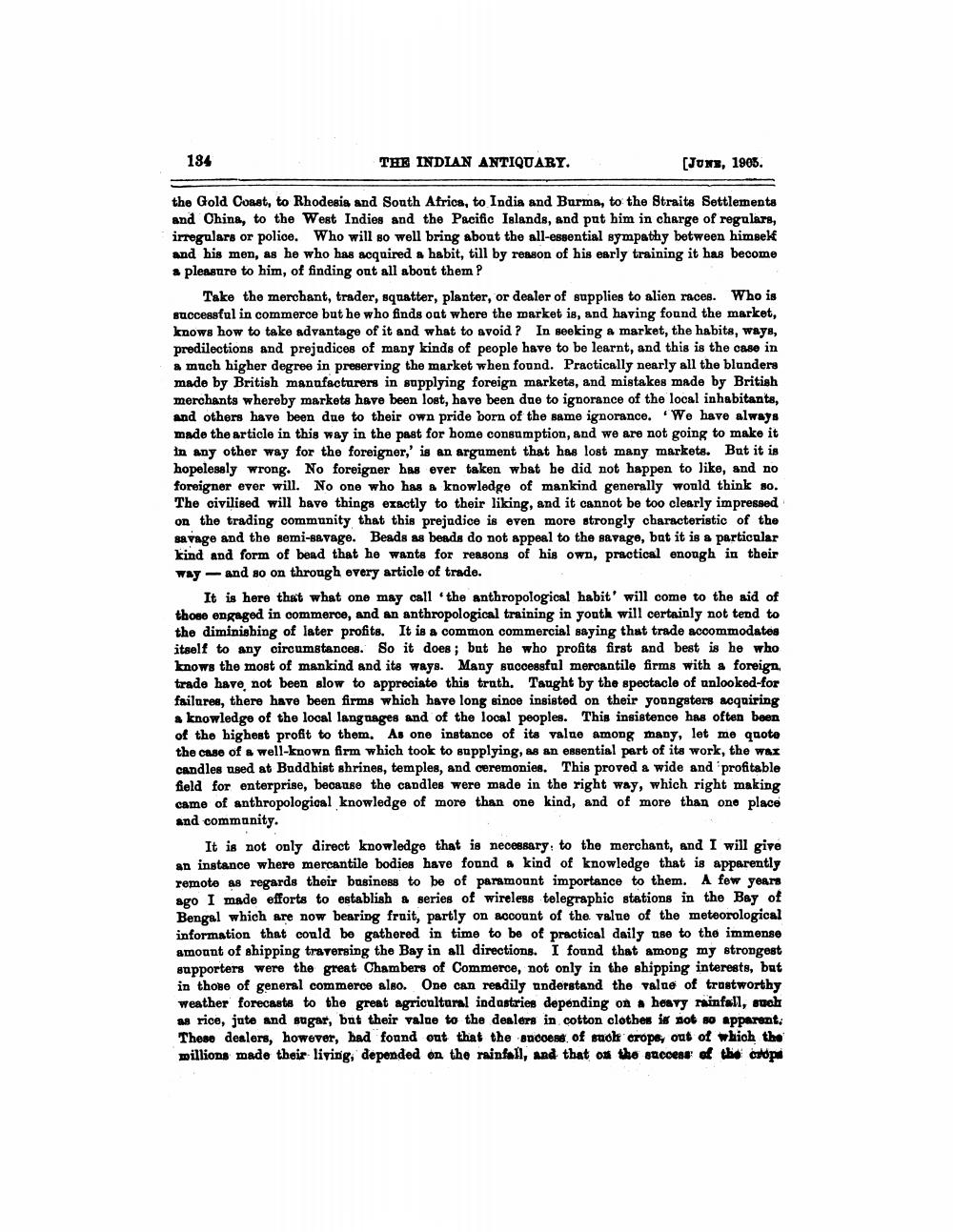________________
184
THE INDIAN ANTIQUABY.
(Juns, 1906.
the Gold Coast, to Rhodesia and South Africa, to India and Burma, to the Straits Settlements and Ohine, to the West Indies and the Pacific Islands, and put him in charge of regulars, irregulars or police. Who will so well bring about the all-essential sympathy between himself and his men, as he who has acquired a habit, till by reason of his early training it has become a pleasure to him, of finding out all about them ?
Take the merchant, trader, squatter, planter, or dealer of supplies to alien races. Who is successful in commerce but he who finds out where the market is, and having found the market, knows how to take advantage of it and what to avoid ? In seeking a market, the habits, ways, predilections and prejudices of many kinds of people have to be learnt, and this is the case in a much higher degree in preserving the market when found. Practically nearly all the blanders made by British manufacturers in supplying foreign markets, and mistakes made by British merchants whereby markets have been lost, have been due to ignorance of the local inhabitants, and others have been due to their own pride born of the same ignorance. We have always made the article in this way in the past for home consumption, and we are not going to make it in any other way for the foreigner,' is an argument that has lost many markets. But it is hopelessly wrong. No foreigner has ever taken what he did not happen to like, and no foreigner ever will. No one who has a knowledge of mankind generally would think so. The civilised will have things exactly to their liking, and it cannot be too clearly impressed on the trading community that this prejudice is even more strongly characteristic of the savage and the semi-savage. Beads as beads do not appeal to the savage, bat it is a particular kind and form of bead that he wants for reasons of his own, practical enough in their way - and so on through every article of trade.
It is here that what one may call the anthropological habit' will come to the aid of those engaged in commerce, and an anthropological training in youth will certainly not tend to the diminishing of later profite. It is a common commercial saying that trade accommodates itself to any circumstances. So it does; but he who profits first and best is he who knows the most of mankind and its ways. Many successful mercantile firms with a foreign trade have not been slow to appreciate this truth. Taught by the spectacle of unlooked-for failures, there have been firms which have long since insisted on their youngsters acquiring & knowledge of the local languages and of the local peoples. This insistence has often been of the highest profit to them. As one instance of its value among many, let me quote the case of a well-known firm which took to supplying, as an essential part of its work, the wax candles used at Buddhist shrines, temples, and ceremonies. This proved a wide and profitable field for enterprise, because the candles were made in the right way, which right making came of anthropological knowledge of more than one kind, and of more than one place and community.
It is not only direct knowledge that is necessary to the merchant, and I will give an instance where mercantile bodies have found a kind of knowledge that is apparently remote as regards their business to be of paramount importance to them. A few years ago I made efforts to establish a series of wireless telegraphic stations in the Bay of Bengal which are now bearing fruit, partly on account of the value of the meteorological information that could be gathered in time to be of practical daily use to the immense amount of shipping traversing the Bay in all directions. I found that among my strongest supporters were the great Chambers of Commerce, not only in the shipping interests, bat in thobe of general commerce also. One can readily understand the value of trustworthy Weather forecasts to the great agricultural industries depending on a heavy rainfall, such as rice, jute and sugar, but their value to the dealers in cotton clothes is not so apparent. These dealers, however, had found out that the ancese of such crops, out of which the millions made their living, depended on the rainfall, and that on the success of the cop




